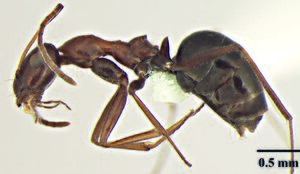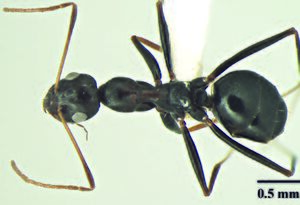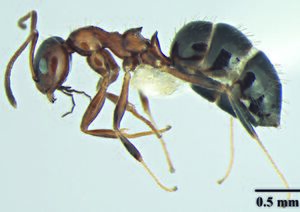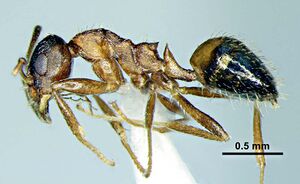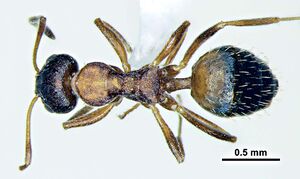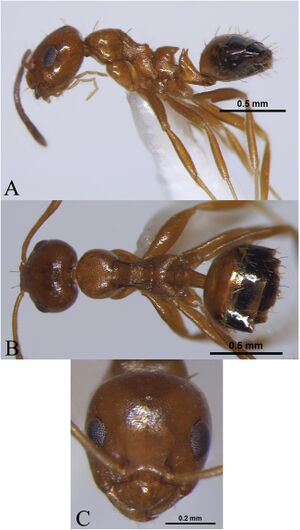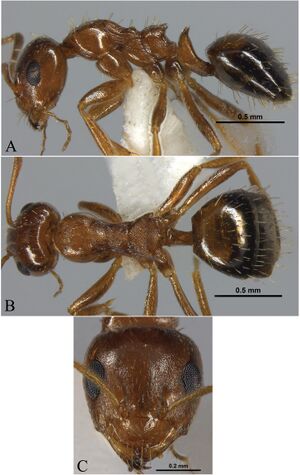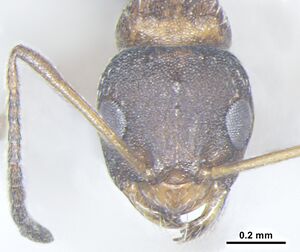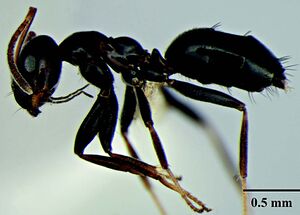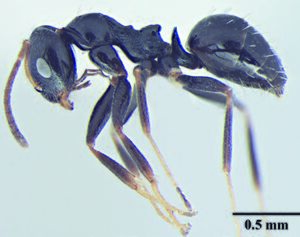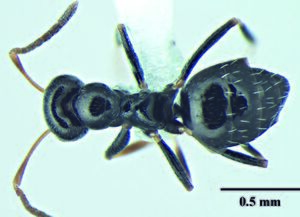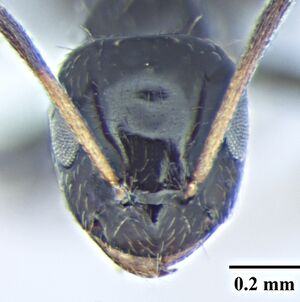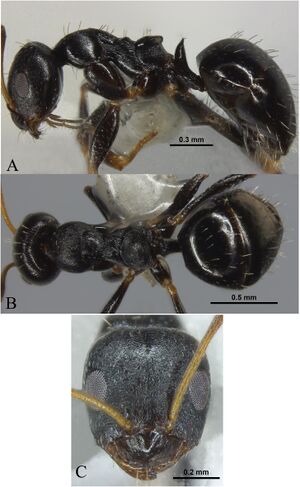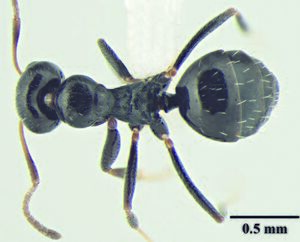Key to Indian species of Lepisiota
This key to workers of Indian species of Lepisiota is based on Wachkoo et al. (2021) as modified by Harshana & Dey (2022).
1
- Antennal scape long, surpassing posterior margin of head by half its length or more (Figs 5, 11, 35) => 2
- Antennal scape shorter, surpassing posterior margin of head by a third of its length or less (Figs 2, 14, 23) => 4
2
return to couplet #1
- Bicolored, head and gaster dark brown to black, mesosoma reddish brown (Fig. 5) => Lepisiota bipartita
- Uniform reddish-brown or black-brown (Figs 11, 35) => 3
3
return to couplet #2
- Reddish-brown to dark brown; petiolar scale with distinctly angular sides, dorsally emarginate with teeth-like apical corners (Figs 11–12) => Lepisiota integra
- Black-brown; petiolar scale with smoothly curved sides, dorsally rounded and narrow, without teeth (Figs 35–36) => Lepisiota sericea
4
return to couplet #1
- Bicolored, mesosoma paler than gaster, mainly or entirely reddish (Figs 8, 26, 29) => 5
- Uniformly dark brown to black (Figs 2, 14, 38) => 10
5
return to couplet #4
- Body shiny to subopaque, weakly sculptured with superficial microreticulate sculpturing at most (Figs 26–27) => 6
- Body dull, coarsely sculptured, general appearance opaque (Figs 9, 30) => 8
6
return to couplet #5
- Body with scanty pilosity; posterior margin of head with 2–3 erect setae, dorsum of pronotum with 2–4 long erect setae, mesonotum with 1–2 erect setae, metanotum lacks erect setae and propodeum with 0–1 erect setae (Fig. 1A) => Lepisiota binghami
- Body with abundant pilosity; posterior margin of head with 4–5 erect setae or more, dorsum of pronotum with more than 10 long erect setae, mesonotum with four or more erect setae, metanotum with two or more erect setae, and propodeum with 4–6 or more erect setae (Figs 2A, 3A) => 7
7
return to couplet #6
- Smaller species (HL 0.58–0.59, WL 0.83–0.85); body with appressed pubescence (Fig. 2) => Lepisiota pusaensis
- Larger species (HL 0.80–0.83, WL 1.12–1.21); body with semi-erect pubescence (Fig. 3) => Lepisiota satpuraensis
8
return to couplet #5
- Head reticulate-striate; propodeal spines blunt, directed backward; petiole dorsally emarginate (Figs 7–9) => Lepisiota fergusoni
- Head reticulate-punctate; propodeal spines pointed, directed upward; petiole dorsally bispinose (Figs 28–30) => 9
9
return to couplet #8
- Gaster smooth and shiny (Fig. 8B) => Lepisiota opaca
- Gaster microreticulate and subopaque (Fig. 8E) => Lepisiota pulchella
10
return to couplet #4
- Propodeal spines indistinct; gastral pilosity restricted to few pairs of black setae on the posterior margin of tergites (Figs 32, 38) => 11
- Propodeal spines well-developed as two broadly-based blunt tubercles, teeth or spines; whole gastral dorsum covered with abundant pale setae (Figs 2, 14, 17) => 12
11
return to couplet #10
- Pronotum without setae; body sparsely pubescent, shiny (Fig. 32) => Lepisiota rothneyi
- Pronotum with few short setae; body fairly pubescent, opaque (Fig. 38) => Lepisiota wroughtonii
12
return to couplet #10
- Body abundantly covered with long, erect white setae (Fig. 14) => Lepisiota layla
- Body covered with usual short erect setae (Figs 17, 20, 23) => 13
13
return to couplet #12
- Petiole dorsally emarginate without distinct teeth or spines; mesosomal setae (if any) restricted to pronotum (Figs 2–3) => Lepisiota annandalei
- Petiole dorsally distinctly bispinose; setae present across entire mesosomal dorsum (Figs 17, 20, 23) => 14
14
return to couplet #13
- Head and pronotum smooth and shiny; propodeal spines as two broadly-based blunt tubercles (Figs 22–23) => Lepisiota modesta
- Head and pronotum either microreticulate or microreticulate with feeble striations; propodeal spines pointed or blunt (Figs 16, 20) => 15
15
return to couplet #4
- Head and mesosoma microreticulate with feeble striations (Fig. 4B–C); propodeal spines blunt (Fig. 4A) => Lepisiota wilsoni
- Head and mesosoma microreticulate; propodeal spines pointed => 16
16
return to couplet #15
- Antennal scape with sparse appressed to decumbent pubescence; mesosomal setae sparse; smaller species (HW 0.51–0.57) (Figs 16–18) => Lepisiota lunaris
- Antennal scape with dense subdecumbent to suberect pubescence; mesosomal setae abundant; larger species (HW 0.60–0.69) (Figs 19–21) => Lepisiota mayri
References
- Harshana, A., Dey, D. 2022. Taxonomic studies on the ant genus Lepisiota Santschi 1926 (Hymenoptera: Formicidae: Formicinae) in India, with description of four new species. Oriental Insects 1–34 (doi:10.1080/00305316.2022.2125096).
- Wachkoo, A.A., Bharti, H., Akbar, S.A. 2021. Taxonomic review of the ant genus Lepisiota Santschi, 1926 (Hymenoptera: Formicidae: Formicinae) from India. Bonn Zoological Bulletin 70(2): 227–245 (doi:10.20363/BZB-2021.70.2.227).

